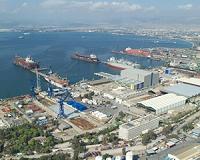| . |  |
. |
Dhaka (AFP) Sept 19, 2010 Global retailers fleeing China's rising labour costs now find themselves facing growing pressure for higher wages in countries from Bangladesh to Cambodia, Vietnam, India and Indonesia. The latest sign that workers are becoming more militant in their demands for a larger share of the region's economic success came in Cambodia last week, when tens of thousands of workers went on strike. The mass protest rejecting a proposed 20 percent pay increase crippled Cambodia's export-orientated garment industry, which produces items for renowned brands including Gap, Benetton, Adidas and Puma. The strike followed a deal between the government and industry that set the minimum wage for garment and footwear staff at 61 dollars a month. Unions want a base salary of 93 dollars. "Workers are having difficulties surviving on their low wages," Kong Athit, secretary general of the Cambodian Labour Confederation, told AFP. The Cambodian action came just weeks after Bangladesh's three million garment workers, who make Western clothes for the world's lowest industrial wages, spurned an 80 percent pay hike, attacking factories and burning cars. Tens of thousands of workers who sew clothes for brands such as H&M and Tesco went on the rampage over the 3,000 taka (43 dollars) monthly minimum wage offer then staged wildcat strikes protesting a four-month delay in implementation. "It is not a living wage," said Shahidul Islam Sabug of the Garment Workers Unity Forum, which wanted 5,000 taka a month to help workers cope with sharp increases in the cost of living, including near double-digit food inflation. Earlier this month, Bangladesh said exports leapt more than 25 percent year on year in July, with manufacturers linking the jump to a shift in orders from China to the low-cost South Asian country. In China itself, workers scored major victories this year at companies such as Japanese automakers Honda and Toyota and Taiwanese IT giant Foxconn, which were all forced to hike pay in the so-called "workshop of the world". In an effort to ease worker concerns, most Chinese provinces, regions and municipalities have raised official minimum wages this year, with Shanghai atop the list, offering monthly pay of at least 1,120 yuan (166 dollars). "Costs are going up in places like China, so you are getting a move to Vietnam, Cambodia, Bangladesh and this is good for these countries," Robert Broadfoot of the Hong Kong-based Political and Economic Risk Consultancy told AFP. And even if manufacturers are now facing wage pressures in the new manufacturing centres, they are on a different scale. "China is getting more expensive. To be sure, less developed countries are too, but the gap between per capita incomes in places like Bangladesh, Cambodia and Vietnam and those in China will continue to widen going forward," Broadfoot said. "Wages of workers in these countries are unlikely to go up in absolute terms step for step with China's wages," In Cambodia, union leaders called off the strike last Thursday after the government stepped in and arranged talks with both manufacturers and unions for later this month. Cambodia's garment industry is a key source of foreign income for the country and employs about 345,000 workers. Social Affairs Minister It Samheng warned that further stoppages could "affect benefits for the workers, employers, and our nation that is facing the impact of the global financial crisis." Bangladesh's protests, which raged for days until a massive police crackdown restored calm, were the most violent of a string of recent strikes in Asian countries. In Vietnam, where independent trade unions are banned and inflation is running at some 8.75 percent there have been 139 strikes in the first five months of 2010, according to the Vietnam Confederation of Labour. The bulk of the protests concern low pay and poor conditions, with many of them hitting foreign-owned factories. Tens of thousands of workers at a Taiwanese-owned shoe factory in southern Vietnam went on strike in April. In Indonesia, where three powerful trade unions represent the vast majority of the country's 3.4 million unionised workers, there is also mounting pressure to raise the minimum wage. Garment factories in particular, including some that are foreign-owned, have been hit by strikes and disputes over long hours and low wages. The minimum wage is not set in Jakarta and varies from district to district. In 2008 the highest minimum wage was 123 dollars a month in Papua province and the lowest 60 dollars in East Java, according to the manpower ministry. Tens of thousands of workers protested for minimum wage levels to be raised during May Day demonstrations in Jakarta this year, until riot police stepped in to quell the unrest. India, which has a highly vocal workers' movement, has also seen recent disputes over pay and conditions at companies such as mobile handset manufacturer Nokia, car maker Hyundai and the technology and services group Bosch.
Share This Article With Planet Earth
Related Links Global Trade News
 Greece, Thyssen agree on shipyard deal
Greece, Thyssen agree on shipyard dealAthens, Greece (UPI) Sep 17, 2010 After long and acrimonious talks, Greece has clinched a deal to transfer Germany's ThyssenKrupp's control of Hellenic Shipyards to Abu Dhabi's MAR group. "A new page opens for the Greek navy, Skaramanga Shipyards and the entire Greek shipbuilding and ship repair sector," a statement by the Greek Defense Ministry said. Under the agreement the German group will transfer its stake o ... read more |
|
| The content herein, unless otherwise known to be public domain, are Copyright 1995-2010 - SpaceDaily. AFP and UPI Wire Stories are copyright Agence France-Presse and United Press International. ESA Portal Reports are copyright European Space Agency. All NASA sourced material is public domain. Additional copyrights may apply in whole or part to other bona fide parties. Advertising does not imply endorsement,agreement or approval of any opinions, statements or information provided by SpaceDaily on any Web page published or hosted by SpaceDaily. Privacy Statement |